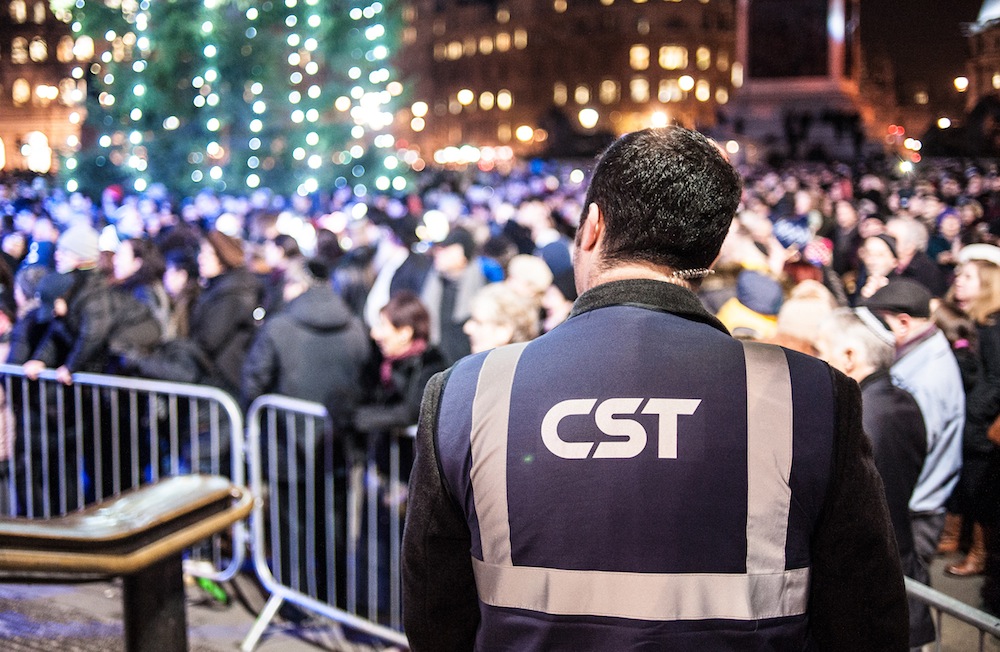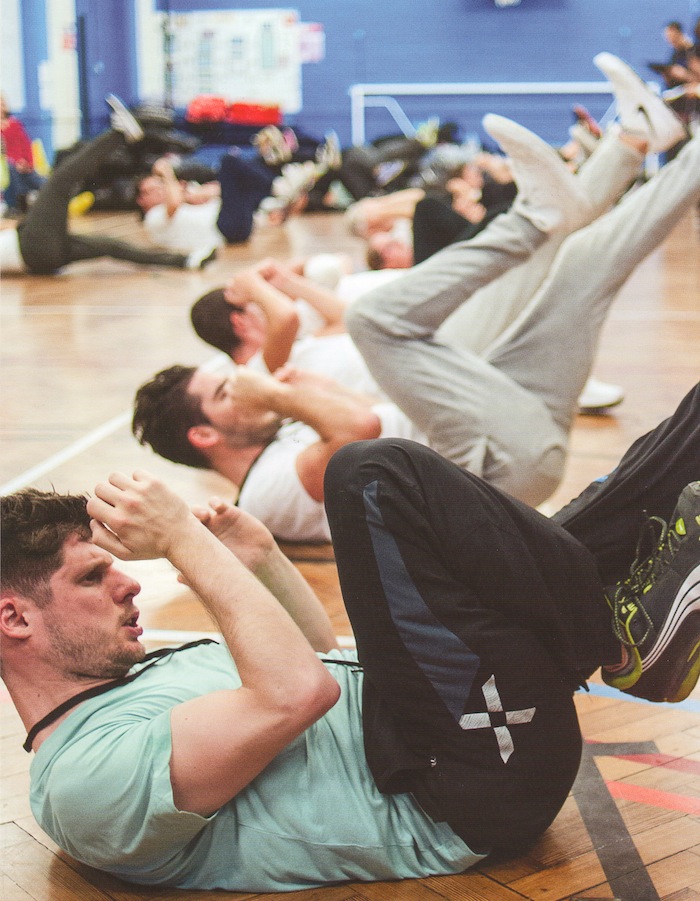British security stalwarts in record demand following Paris, Copenhagen attacks
Published March 15, 2015

A Community Security Trust guard keeps watch over a Hanukkah celebration in 2014. (Blake Ezra Photography)
LONDON (JTA) — On a nondescript street in the London suburbs, guards with earpieces stand watch outside a brown building with blast-resistant doors and windows.
The building does not advertise the identity of its occupants, and the guards do not appreciate loitering by individuals curious to find out.
Though it resembles a secret government facility or money vault, the building is actually the headquarters of the Community Security Trust, widely considered the best-organized Jewish defense force in Europe and one of British Jewry’s most admired institutions. With an annual budget of $7.5 million, the CST has served for 20 years as the Jewish community’s shield, research service and anti-Semitism watchdog.
In the United Kingdom, the CST has become the natural address for record numbers of volunteers who have inundated the group with applications following the slaying of five Jews in two Islamist attacks earlier this year in Paris and Copenhagen. Within weeks of the attacks, the group had dispensed the entirety of its annual budget of matching funds for community security upgrades.
Outside Britain, Jewish groups from across Western Europe have sought CST’s assistance in developing the sort of skills in crisis management, training and outreach honed by the group over the years.
“We’re sort of CST copycats,” said Michael Gelvan, the Copenhagen-based chairman of the Nordic Jewish Security Council, a regional security network set up in 2010. “For us, CST’s structure and capabilities are absolutely the standard.”

Volunteers training at the Community Security Trust headquarters in London. (Courtesy photo)
This week, JTA gained rare access to CST’s London-area headquarters, which comprises a buzzing situation room, a large gym area for briefings, a self-defense training room and conference rooms fitted with video equipment that link with CST’s two other centers, in Leeds and Manchester.
The organization employs a staff of about 60 and a corps of 3,000 volunteers. Its budget comes almost entirely from donations.
After four people were gunned down at the Jewish Museum of Belgium last year, CST was the only foreign Jewish security service that sent a delegate to the situation room set up by the European Jewish Congress in Brussels.
Sending delegates “allows CST to share its experience with other communities when it counts, but also to learn from the situations they encounter,” said Mark Gardner, CST’s director of communications.
In 2003, CST sent representatives to Istanbul after the bombing of two synagogues left 27 dead and 300 wounded. The representatives learned that most of the injuries from the attack were caused by shards of glass from broken windows. Subsequently, Gardner said, CST installed anti-shatter film “literally on every community-building window.”
In the past, Jewish communal defense in England was the responsibility of the Board of Deputies of British Jews. But following Palestinian terrorist attacks against European Jews in the 1990s, British Jews decided in 1994 to establish CST as a stand-alone agency responsible for tactical security as well as its own budget and fundraising.
CST’s chairman, Gerald Ronson, said last year that the danger of jihadist terrorism dominates his organization’s work. But as he noted in CST’s 2014 report, the effort to defend against that threat draws from decades of experience in dealing with fascists and neo-Nazis.
Today, the group’s volunteer guards in CST vests are ubiquitous in Jewish neighborhoods standing sentry outside synagogues and at large communal gatherings. But in the wake of several deadly terrorist attacks against Jewish targets in Europe in recent months, CST resources have been put to the test like never before.
Within three weeks of the killing of four Jews on Jan. 9 at a kosher supermarket near Paris, CST had pledged all of the $750,000 it had set aside this year for the Security Enhancement Project, an initiative in which the CST matches funding for security upgrades provided by individual communities. Some $7.5 million has been allocated through the project since 2008.
“Schools, synagogues and other institutions that we had already advised long ago to up their security arrangements rushed to ask us for funding,” Gardner said.
Along with the requests for help came an unprecedented flood of volunteers. More than 150 people seeking to enlist as card-carrying security guards for CST approached the organization in the aftermath of the Paris attack. The rush broke a record set only last summer, when 150 people stepped forward following an uptick in anti-Semitic attacks tied to Israel’s war in Gaza, according to Gardner.
One of the new recruits is a 20-year-old university student who, for security reasons, asked to be identified only by his first name, Howard.
“I wanted to volunteer when I turned 18, but my friends made fun of me, asking why I wanted to play at being a soldier,” Howard said. “No one laughed after the Paris attacks. We all know it could happen here tomorrow.”
Among British Jews, there are signs of a growing security consciousness. In Golders Green, a heavily Jewish London neighborhood where many shops prominently display Hebrew-language signs, locals twice approached a visiting journalist recently to ask about his business there. At one north London Orthodox school, 150 parents showed up for two sessions on security procedures following the Paris killings. Last year, only 10 parents showed up for a similar session.
“It’s troubling because it shows that people are scared,” Gardner said. “On the other hand, it’s good that they can do something about it. It’s what we’re here for.”
Yet alongside a growing recognition of CST’s significance, the organization is also facing criticism over what some see as a lack of transparency.
Geoffrey Alderman, a historian and commentator for The Jewish Chronicle of London, has been vocal in his demand that CST reveal the names of its trustees, which are unlisted with permission from the Charity Commission for security reasons.
In a recent lecture, Alderman charged that CST is unaccountable to the community it serves, noting that communal defense was once the province of the Board of Deputies, whose leadership is elected democratically. CST’s is not.
Gardner said CST “made use of a dispensation given by police to prevent exposing out trustees to people who might seek to hurt them.” For that, he added, “CST is making absolutely no apologies.”
![]()















